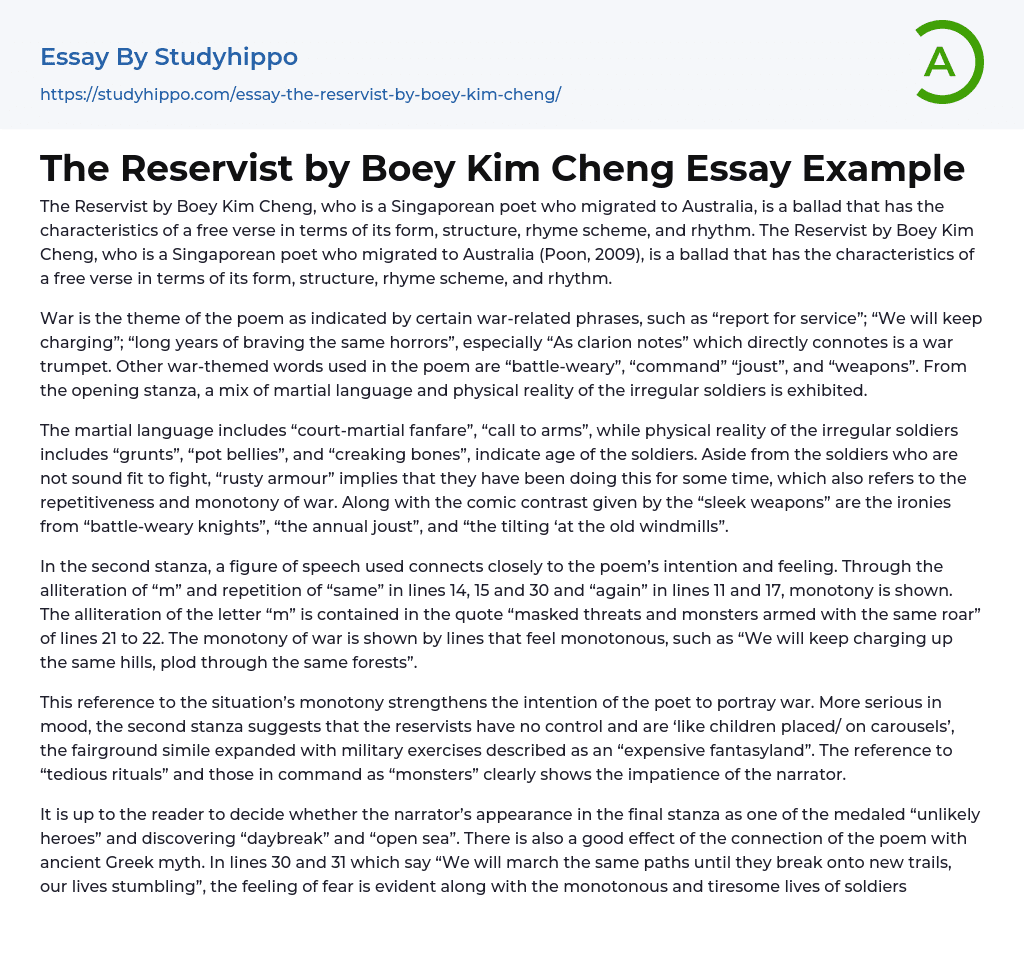The Reservist by Boey Kim Cheng, who is a Singaporean poet who migrated to Australia, is a ballad that has the characteristics of a free verse in terms of its form, structure, rhyme scheme, and rhythm. The Reservist by Boey Kim Cheng, who is a Singaporean poet who migrated to Australia (Poon, 2009), is a ballad that has the characteristics of a free verse in terms of its form, structure, rhyme scheme, and rhythm.
War is the theme of the poem as indicated by certain war-related phrases, such as “report for service”; “We will keep charging”; “long years of braving the same horrors”, especially “As clarion notes” which directly connotes is a war trumpet. Other war-themed words used in the poem are “battle-weary”, “command” “joust”, and “weapons”. From the opening stanza, a mix of martial language and physical reality of
...the irregular soldiers is exhibited.
The martial language includes “court-martial fanfare”, “call to arms”, while physical reality of the irregular soldiers includes “grunts”, “pot bellies”, and “creaking bones”, indicate age of the soldiers. Aside from the soldiers who are not sound fit to fight, “rusty armour” implies that they have been doing this for some time, which also refers to the repetitiveness and monotony of war. Along with the comic contrast given by the “sleek weapons” are the ironies from “battle-weary knights”, “the annual joust”, and “the tilting ‘at the old windmills”.
In the second stanza, a figure of speech used connects closely to the poem’s intention and feeling. Through the alliteration of “m” and repetition of “same” in lines 14, 15 and 30 and “again” in lines 11 an
17, monotony is shown. The alliteration of the letter “m” is contained in the quote “masked threats and monsters armed with the same roar” of lines 21 to 22. The monotony of war is shown by lines that feel monotonous, such as “We will keep charging up the same hills, plod through the same forests”.
This reference to the situation’s monotony strengthens the intention of the poet to portray war. More serious in mood, the second stanza suggests that the reservists have no control and are ‘like children placed/ on carousels’, the fairground simile expanded with military exercises described as an “expensive fantasyland”. The reference to “tedious rituals” and those in command as “monsters” clearly shows the impatience of the narrator.
It is up to the reader to decide whether the narrator’s appearance in the final stanza as one of the medaled “unlikely heroes” and discovering “daybreak” and “open sea”. There is also a good effect of the connection of the poem with ancient Greek myth. In lines 30 and 31 which say “We will march the same paths until they break onto new trails, our lives stumbling”, the feeling of fear is evident along with the monotonous and tiresome lives of soldiers.
Assuming the voice and persona of a part-time soldier, the poet has the objective of showing the repetitive nature of war. In the entire poem, there is a self-deprecating and amused tone of the narrator, the army, and the routines. However, the poem ended with a tinge of optimistic tone, indicating that something worthwhile will be achieved ultimately, although it could also be interpreted as a final joke. Generally,
the poem successfully created a feeling of fear, monotony, and age that prevailed in the tone.
- Book Summary essays
- Metaphor essays
- Reader essays
- Rhyme essays
- Literary devices essays
- Villain essays
- Books essays
- Genre essays
- Literary Criticism essays
- Writer essays
- Protagonist essays
- Simile essays
- Poem essays
- Book Report essays
- Book Review essays
- Greek Mythology essays
- Plot essays
- Tragic Hero essays
- Coming of Age essays
- Play essays
- Rhetoric essays
- Rhetorical Question essays
- Translation essays
- Understanding essays
- Reason essays
- Character essays
- Letter essays
- American Literature essays
- Literature Review essays
- Utopia essays
- Poetry Analysis essays
- Dante's Inferno essays
- Between The World and Me essays
- Incidents in The Life of a Slave Girl essays
- Flowers for Algernon essays
- Myth essays
- Everyday Use essays
- Boo Radley essays
- Genesis essays
- Richard iii essays
- Alice in Wonderland essays
- On the road essays
- Ozymandias essays
- The Nightingale essays
- Holden Caulfield essays
- Animal Farm essays
- 1984 essays
- A Hanging essays
- Shooting An Elephant essays
- A Tale Of Two Cities essays




